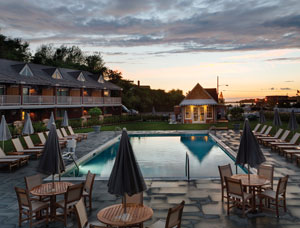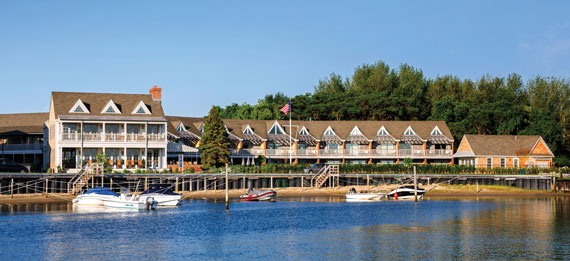While the country’s hospitality market has started to cool, developers are betting there is still room on Long Island’s East End for upscale boutique hotel conversions.
Two months ago, New York-based Eagle Point Hotel Partners bought the family-owned Sound View Inn in Greenport aiming to do a makeover of the 45-room hotel.
Ian Reisner, co-owner of Manhattan’s Out NYC Hotel, and a partner nabbed a commercial strip in Fire Island last year with plans to work some boutique magic on one of its properties, the Botel Fire Island Pines hotel.
On Shelter Island, the 37-room Chequit, which Salt Hotels purchased in 2014 for $3.3 million, re-opened last May with a new restaurant, event space and ample Wifi.
And while the made-over Gurney’s in Montauk with more than 100 keys is bigger and brassier than most boutiques, its owners three months ago acquired the 10-acre Panoramic View property next door, including 50 hotel rooms — a development that analysts say is a positive sign for the East End.
“It’s a strong sign that the market does live,” said Edward Eschmann, director of the tri-state valuation group for CBRE.
Overall, Long Island’s hospitality sector is growing, according to hotel owners and industry observers. PKF Consulting, a division of CBRE, is tracking eight projects and 1,300 rooms in the pipeline, said Mark van Stekelenburg, who heads the division’s New York City office.
But there’s less shuffling of the deck than there was a few years ago, when numerous lodging properties went on the market or were bought with boutique conversions or upgrades in mind.
“All the owners who have owned for the past 20 or 30 years have not changed their expectations as to what is the value of their hotel,” said hospitality investor and consultant Steven Kamali.
Nonetheless, Long Island ended 2015 with a 5.8 percent increase in revenue per available room (RevPAR) over 2014, compared to 6.3 percent nationally, according to STR Global. In Suffolk County, RevPAR growth last year reached 6.7 percent, nearly twice the rate of increase in 2014, according to STR.

Pool at Baron’s Cove
In recent years, much of the action in Long Island’s pricey boutique hotel market, where room rates in some locations start at $500 a night, has taken place on the East End. In the Hamptons and Montauk, renovated properties such as the Topping Rose House, the Surf Lodge and the Montauk Beach House continue to market upscale, luxury offerings. Meanwhile, recent redos on Shelter Island, the North Fork and Sag Harbor are promoting a more laid-back atmosphere.
“There are a lot of different dynamics on the North Fork and the South Fork,” said Erik Warner, a principal at Eagle Point Hotel Partners, the new owner of the Sound View in Greenport.
At the Sound View, it’s all about connecting with the local culture — farming, fishing and vineyards — and providing guests with “an emotionally impactful experience,” Warner said.
The Sound View, which closes for the winter, is set to re-open for business in March 2016, but Warner says he will wait until he gets a better sense of life on the North Fork before commencing renovations. In the meantime, the hotel executive is looking for a food and beverage partner that “will live and breathe the culture of the North Fork,” he said.
Across the Peconic River, at the Chequit on Shelter Island, the new owners are marketing affordability and accessibility. The hotel reopened last July after a $2.2 million upgrade. Its largest accommodation in the main house, a two-room suite, goes for $795 in peak season, while the smallest go for $295 to $395. In the nearby “summer house” a couple can get a room for as little as $195 in high summer.
“I felt the gap was in the middle, that that is where the Chequit should be positioned in terms of pricing and décor,” said Salt Hotels’ chief executive officer, David Bowd. ‘’That’s our sweet spot.”
The formula apparently worked. The Chequit turned a profit in its first year, according to Bowd. Now the challenge is to do that regularly in a year-round business. “We make 80 percent of our revenue over 16 weeks and if we have a rainy weekend, it can make a lot of difference,” he said.
In Sag Harbor, the 67-room Baron’s Cove started operations again this past June, following a $21 million acquisition and renovation that transformed it from a motel-cum-bar and restaurant into what the new sponsors, Cape Advisors, are calling a waterfront resort.
The boutique hotel property is also selling proximity to regional attractions, such as vineyards, museums and art galleries. With refurbished guest rooms and a trendy restaurant, new owner Curtis Bashaw said he’s focused on the weekend getaway market.

Baron’s Cove
“We tried to fit a niche. Not a five-star, $1,000-a-night hotel, but accessible and designed and curated so that it feels like a very nice place to stay,” said Bashaw, co-founder and co-managing director of Cape Advisors, which owns eight other boutique hotels in Cape May and Atlantic City, N.J., as well as Manhattan. “We sell service and serenity, not a scene where everyone is parading around.”
Like the Chequit and Baron’s Cove, the 100-room Hotel Indigo in Riverhead has the challenge of attracting business in the off-season, something waterfront properties, many of which close down in the winter, don’t have to do.
A former Best Western motel, the property is now branded under InterContinental Hotels Group’s boutique chain. Though not a new conversion (the hotel re-opened in 2010), it too is selling a regional vibe, including locally brewed beer and locally sourced food in its restaurant.
Robert Salvatico, a partner in Jaral Properties, which owns the Indigo, said it was rough going in the early years between 2010 and 2012, when the lingering effects of the recession were still in play. But that started to turn in late 2012.
Now the hotel executive is planning an expansion to include new amenities, such as a spa and wellness center, retail space and luxury suites.
“Instead of staying for a night or two, maybe people will stay three or four nights, book a larger suite, do some shopping and get an East End experience,” he said.
